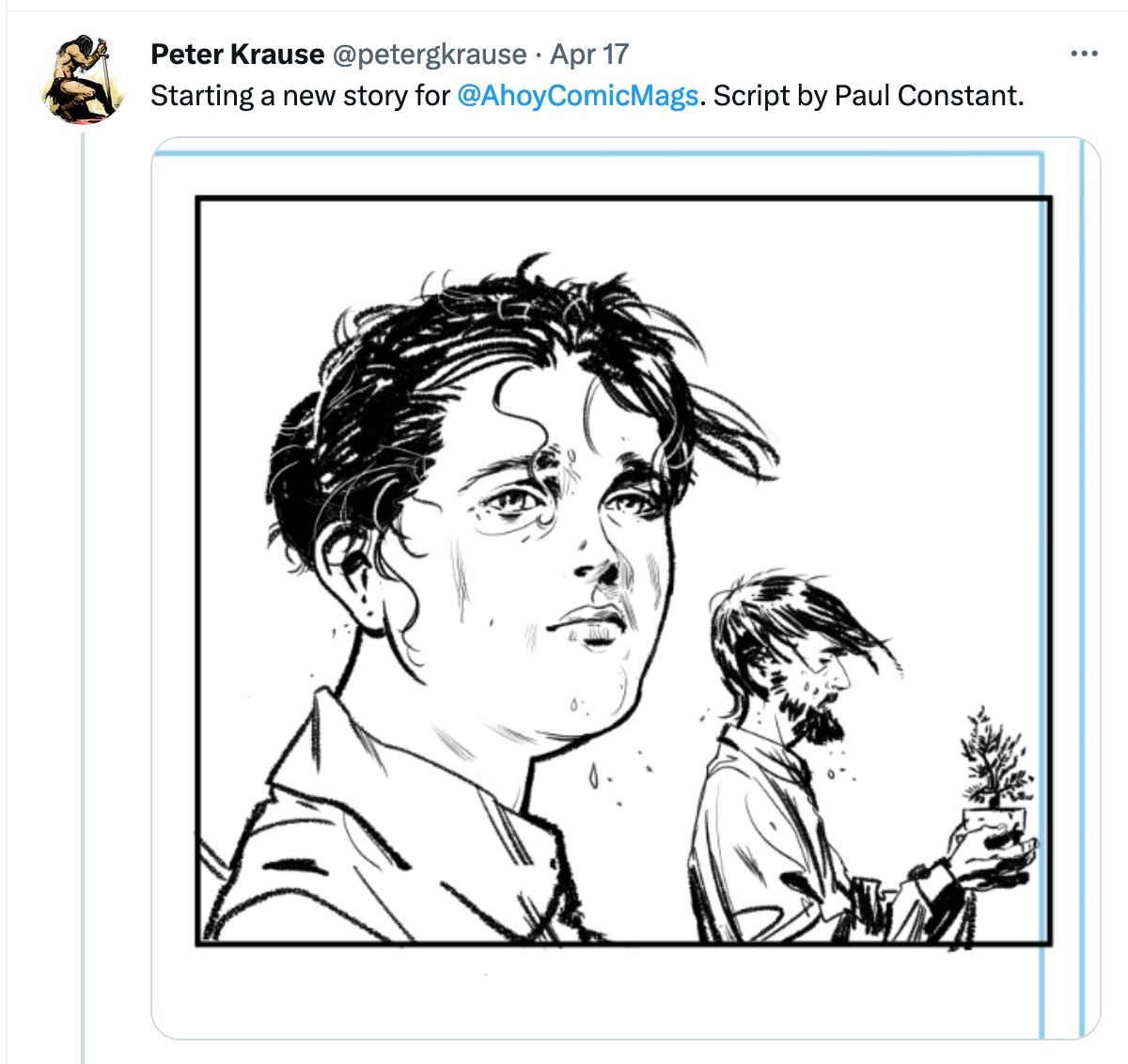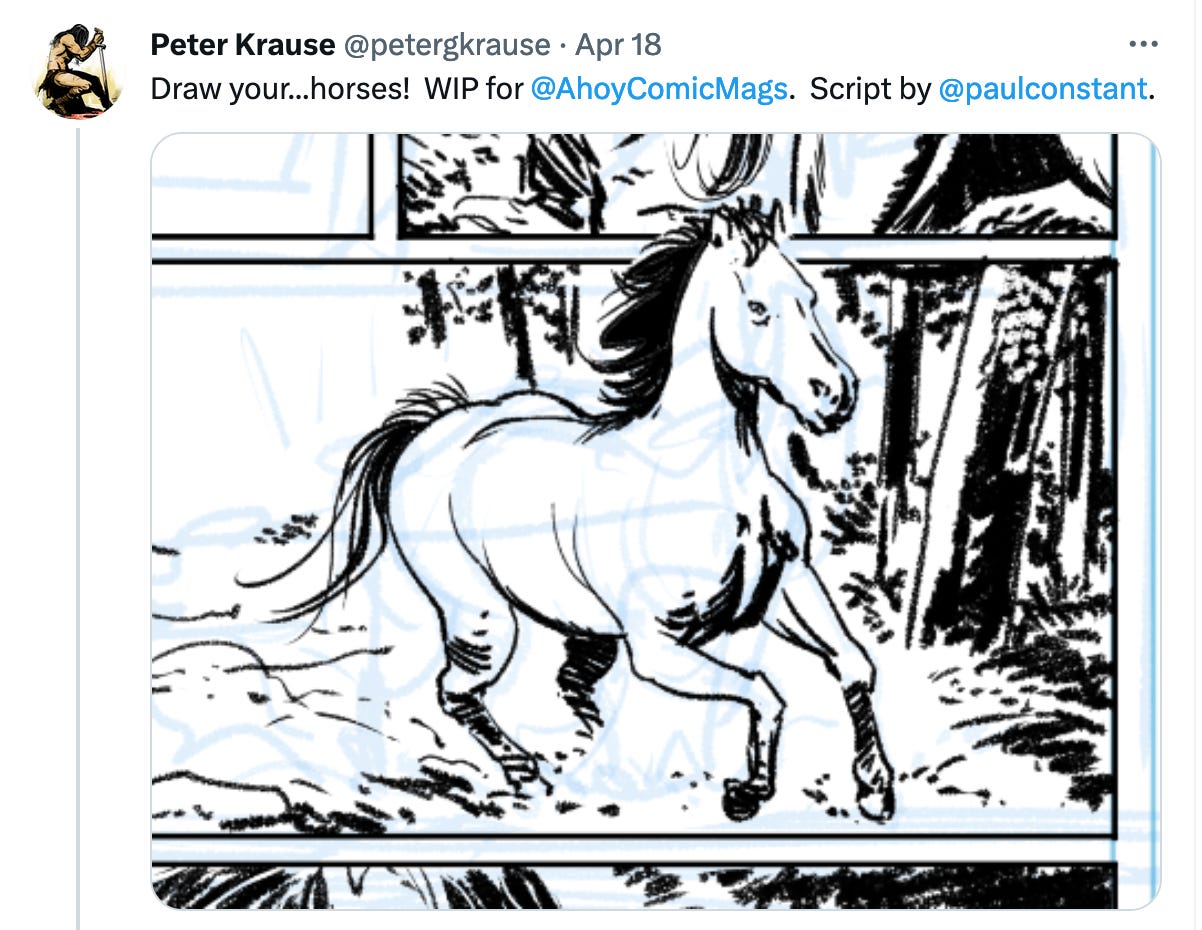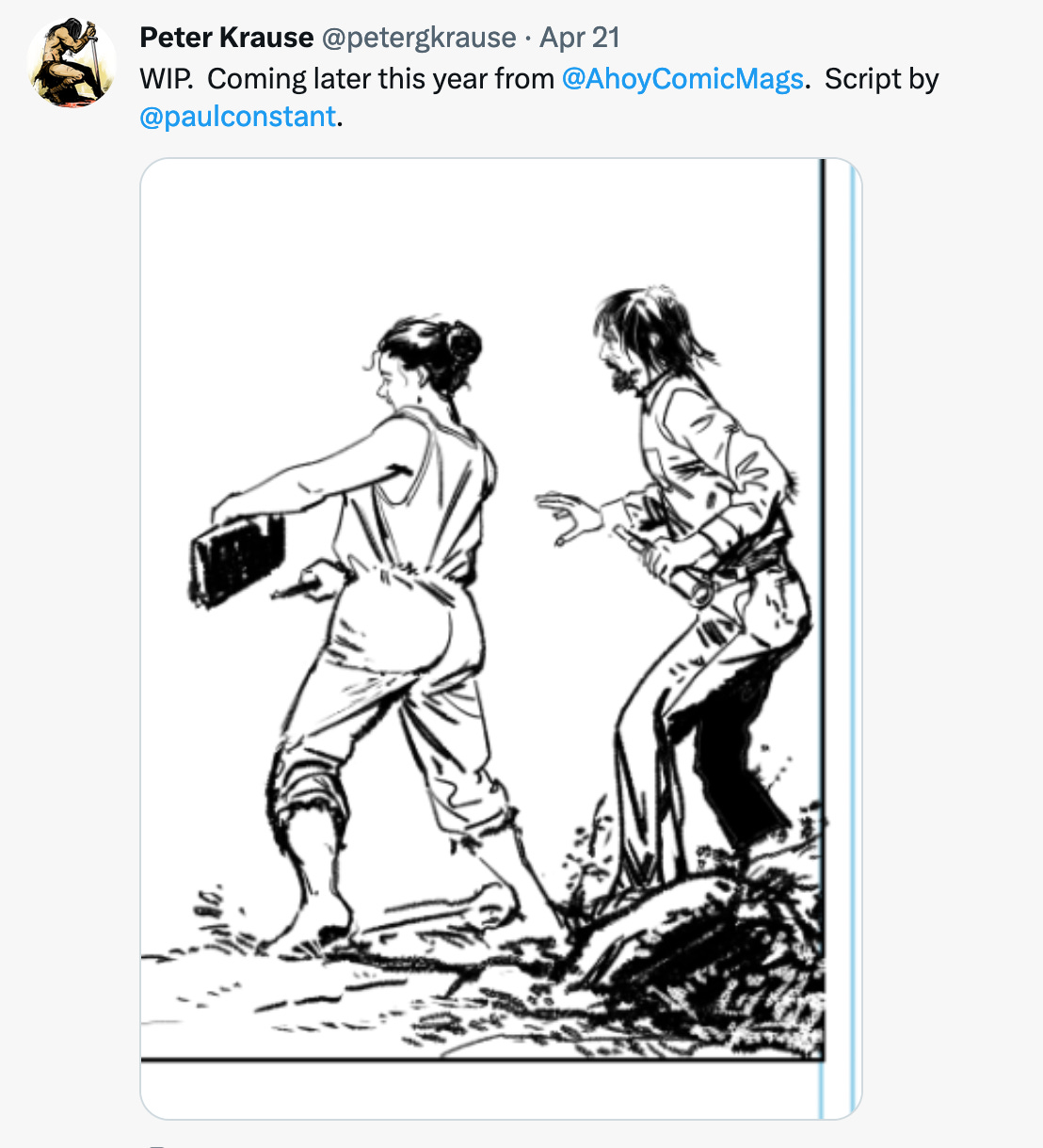A Human Wrote This
Hello!
Just about every writer I know has lost their mind over ChatGPT and other AI language models this year. And for good reason! AI has become very good at producing passable text almost instantaneously, and it’s practically free. Now that Amazon has gotten into the generative AI language model game, I think the entire field of professional writing is about to change for the worse. Amazon’s greatest talent isn’t e-commerce—it’s the relentless devastation of entire industries through the clever application of hyper-efficient technology.
In the short term, a lot of professional writers are going to be out of work. When I state this belief anywhere online, a lot of writers get mad at me. Don’t get me wrong—I don’t think that AI is better at writing than most human professional writers. I believe that good writing is important to a functioning society, and I don’t believe that AI will ever be able to produce truly great writing.
But it’s like that old punchline: “I don't need to run faster than the bear; I just need to run faster than you.” AI doesn’t have to be better at writing than most professional writers; in most corporate settings it just has to be good enough to satisfy middle managers. And most middle managers have a very low bar for what constitutes serviceable writing. The problem is that excellent writing and editing is an invisible art, and the people in charge of hiring writers don’t, as a rule, have the ability to understand what makes a piece of writing excellent.
This is dark stuff, and I hope I’m wrong. But it feels like I’ve been here before. As a bookseller in the late 1990s and early 2000s, I sat in many rooms where older booksellers proclaimed that nobody wanted to buy books from faceless online stores, or that nobody wanted to read a book off a screen. Today, independent bookstores are still thriving in many parts of the country, but a whole lot of bookstores went out of business over the last twenty years, and great swaths of the country—mainly poor and rural areas—are now book deserts.
I think a similar kind of devastation is about to happen to writers. Writing is about to become (even more of) a boutique profession that is only supported in fields and locations with great wealth. Pretty much every non-boutique copywriting or content production job—clickbait blogs, cheap public relations firms, etc.—will be farmed out to AI, with maybe one overworked and underpaid human contractor on hand for quality control purposes.
This is bad for the written word. Soon our inboxes will be choked with floods of personally targeted AI-produced spam emails that cost fractions of pennies to create. Press releases written in bland AI language will flood the inboxes of media professionals. News sites will fill up with blandly written crap that will then swarm social media with the help of bots. Sloppy but mostly serviceable writing will be everywhere, to the point that we’ll begin to perceive the written word as radio static, an obnoxious background hum to be ignored. We’ll recruit AI bots to weed out the AI-written emails in our inboxes, and billions of documents will be composed and deleted by artificial intelligence every hour without one human eye ever seeing them.
I expect that in the short run, AI will finally inspire the “pivot to video” that Facebook tried to kick off (through outright fraud) a decade or so ago. We’ll become so exhausted by the wall of bland, meaningless text weighing down our phones that we’ll only trust news or opinions if they’re delivered by a real human being—and the only way to confirm that a real human being is sharing the news and opinions will be if we can actually watch the words escaping their mouths. (Of course, we’re also not too far away from anyone being able to create cheap and convincing AI video newsreaders that look and sound like real human beings, but that’s a problem for a few years down the road.)
And I think that fiction writers are still safe, for at least a while. I’ve asked Google’s Bard to write a story, and the results are as boring and weightless as a stranger trying to explain a dream to you on an airplane. But I also don’t think we’re that far away from being able to ask Disney’s Storyteller AI™ to write us an officially sanctioned fanfic novel about Spider-Man meeting and falling in love with Princess Leia, and I think many fans would be thrilled enough by that experience to forgive the uninspired AI prose.
In the past, automation has largely taken jobs from blue-collar, working-class professions. And the response from leaders has largely been underwhelming—they tell 45-year-old factory workers to get retrained or move, and then they’re shocked when those laid-off workers resent them for being out of touch. I’m interested to see how leaders respond when automation comes for a job that’s traditionally been a white-collar profession.
In a just world, humans would be able to enjoy leisure and play while the robots took over work in our stead. But I just asked Google’s Bard AI model to tell me a story about that kind of utopia, and the story the computer told me included societal unrest due to widespread unemployment. I guess even artificial intelligence can’t imagine a happy ending for this particular situation.
I’ve Been Writing
For the Seattle Times, I wrote about Nook & Cranny Books & More, a new shop on Capitol Hill’s 15th Ave. It’s in the space formerly occupied by “bibliotherapy” bookstore Oh Hello Again, and browsing this tiny shop is a delight.
On Twitter, the great comic artist Peter Krause posted three wonderful previews of a project I wrote that he’s currently drawing.
(Link to tweet, because Elon Musk is breaking Twitter embeds on Substack.)
(Link.)
(Link.)
I’ve been reading Peter’s comics since the 1990s—his Power of Shazam! is a favorite, and it’s currently being reprinted by DC. So getting the pages for this story in my inbox is a dream. It’s a story that feels very personal to me, and it just couldn’t be in better hands with Peter on art. I’m excited to tell you more about it later this year!
I’ve Been Reading
The Laughter by Seattle author Sonora Jha is a satirical novel told from the perspective of an old white professor who stalks a young Pakistani Muslim professor. It’s a dark comedy about cancel culture, and Jha manages to freshen up the exhausted campus satire genre with her sharp sense of satire.
Jen Beagin’s Big Swiss is another novel that takes place in an exhausted genre—the misanthrope’s complaint. It’s a story about a medical transcriptionist who becomes obsessed with the woman in therapy sessions she’s transcribing. She eventually seeks out the patient and tries to insinuate herself into her life using knowledge culled from the recordings. In the 1990s, this book would have been written by Martin Amis, it would have starred a male protagonist who was portrayed as a hero, and it would have been half as good.
I read a couple of gossipy nonfiction books featuring behind-the-scenes drama this month. The Fight of His Life is Chris Whipple’s account of the first two years of the Biden presidency, and it’s got plenty of office drama and political tension. One of Whipple’s scoops in this book is the fact that President Biden doesn’t necessarily trust all the members of his Secret Service team to be loyal to him over Trump, which is a truly horrifying fact if you spend more than three seconds contemplating the ramifications. Not an essential read, but if you like to learn how the political sausage is made, there’s plenty of interesting stuff here. And Michael Schulman’s Oscar Wars reveals the backstage drama in several of the most high-profile Academy Awards campaigns in history. Perhaps it’s because this was one of the first Oscars that captured my attention as an adult, but I loved the section about how Miramax’s Shakespeare in Love essentially stole the Best Picture Oscar from Saving Private Ryan. It’s somehow refreshing to hear that Steven Spielberg, who’s been Hollywood’s dad for pretty much my entire life, was full-on pissed at Harvey Weinstein for the way he manipulated the Academy.
Speaking of Hollywood, Sarah Polley has evolved from one of my favorite actors to one of my favorite filmmakers, so I was virtually guaranteed to love her memoir-in-essays, Run Towards the Danger. But I think it surpassed even my inflated expectations. Her accounts of growing up as a child actor, learning how to work within a system full of sexual harassment and gender inequality, and overcoming several health crises under the watch of uncaring medical professionals are well-written and full of the anger and introspection that makes her films stand out to me.
Before the Coffee Gets Cold is a cozy time-travel novel by Toshikazu Kawaguchi about a coffee shop that enables people to travel through time. The problem is that the time travelers are subject to a number of constraints while they’re traveling: They can only travel through time on one seat in the cafe, for one thing, and they can’t leave the seat while they’re traveling. Further, the travelers have to return to the present before the coffee in their cup goes cold. The rules, which are repeated in the narrative a bit too often for my tastes, keep the story grounded and the stakes low.
Priya Guns essentially admits in the acknowledgements of her novel Your Driver Is Waiting that the book is is unabashedly intended to be a Taxi Driver for the age of Uber. I enjoyed both Drivers, but the elements that I liked least about the novel were the scenes that were clearly most influenced by the Scorsese film. Damani, the protagonist, deserves more than to be a modernized, gender-flipped response to Travis Bickle—I really felt for her desperation to make ends meet by ferrying customers everywhere in her beater of a car, and I wish the book stuck with those stakes rather than escalating into an exploration of obsession and alienation.
Social Media Update: Social Media Still Sucks!
This month, Substack introduced its Twitter clone, which it calls Notes. Notes is probably most, uh, noteworthy because Substack CEO Chris Best embarrassed himself by basically refusing to say he’d kick Nazis off the platform in an interview with The Verge. I’m messing with Notes a bit, but it feels like if LinkedIn and Medium had a baby: Everyone on it is too slick, too professional, too eager to sell you something. (And yes, I am thinking about leaving this goddamned website for the second time because it’s owned by people who refuse to say that hate is bad.)
So what’s the state of social media? I very occasionally post work-related stuff to Facebook and Twitter, but I’ve stopped visiting both platforms and I don’t miss either of them. I do have a profile on Post, but I barely ever go there because it has all the cultural vibrance of a Daily Kos comment thread on Thanksgiving weekend. I watch videos on Tik Tok, but I will never be comfortable making or being in videos.
The social media platform I spend the most time on, by far, is Mastodon. It’s still only a fraction of the time that I used to spend on Twitter, but I enjoy the weirdos and nerds I follow there, and they introduce me to new perspectives, which was my favorite part of Twitter.
That said, the Mastodon experience is janky as hell. It’s hard to follow people, the app can sometimes take two or three minutes to update, and the first instance I joined disappeared due to drama so I had to basically wipe out my profile and start over. There’s no network-wide search, so you have to use hashtags for discovery, which is such an ugly and clunky way to navigate the internet. Worse still, Mastodon is full of technically astute computer people who are incredibly eager to explain to you in great detail why all of the above is Good, Actually—a feature and not a bug—even though it makes for a really awkward and frustrating experience for casual users like me.
So for now you can find me on Mastodon. I post little wrapups of my weekly long walks every Saturday or Sunday, and I’ll engage in conversations with other users because those interactions don’t usually turn into bar brawls the way every interaction on Twitter does. But I can also picture myself just drifting away from the platform one day and never coming back. It’s quite possible that no social media site will ever enthrall me the way Twitter did back in the day—and that’s okay.
I can’t argue that social media has been a net negative in my life. I’ve made lots of friends and been introduced to all kinds of perspectives that have expanded my understanding of the world. But it’s time to move on. The foundational idea of social media, of broadcasting our thoughts to as wide an audience as possible, was broken from the start. We can and will have better conversations in smaller rooms.
Take care of yourself,
Paul


